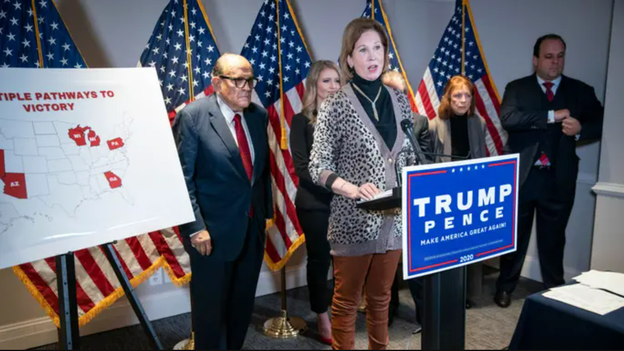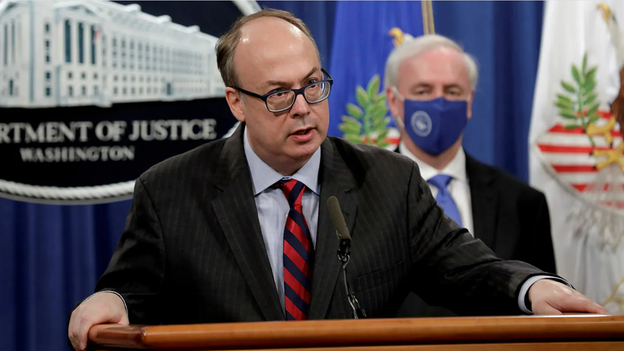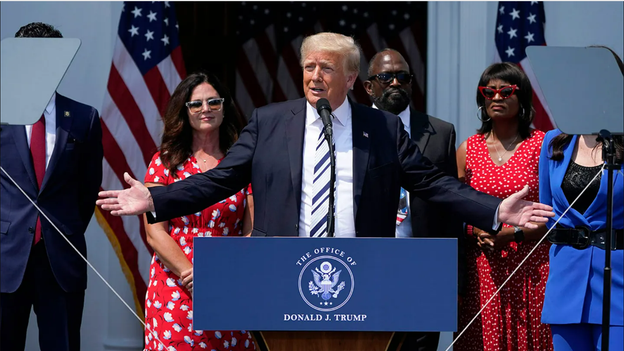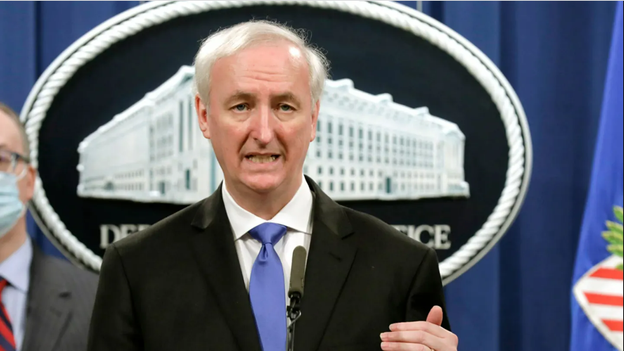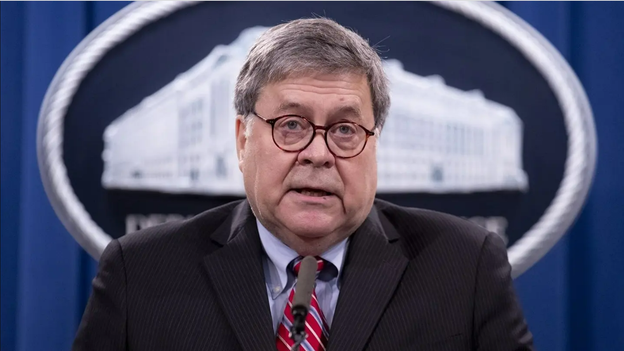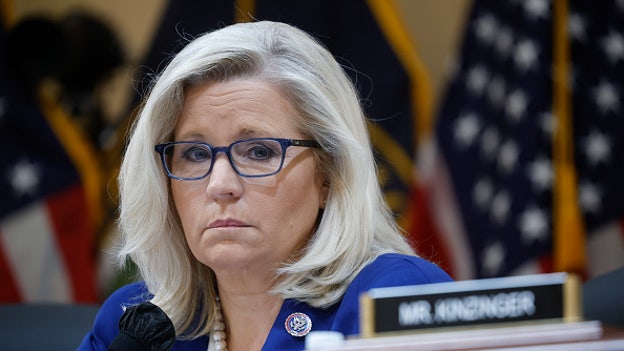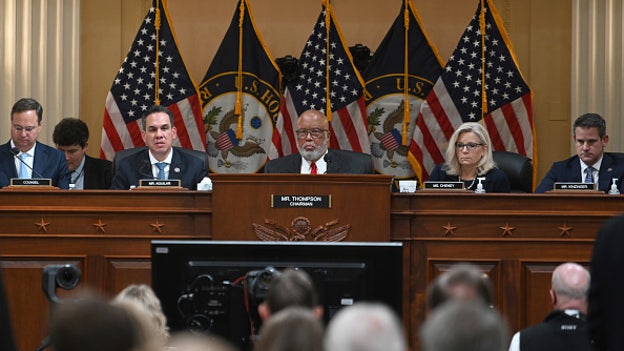Jan. 6 committee: Thursday hearing will focus on Trump pressuring DOJ over 2020 election
The Jan. 6 Select Committee is set to hold its fifth public hearing Tuesday. The hearing will focus on former President Trump allegedly pressuring the U.S. Department of Justice to say there was fraud in the 2020 election. The hearing will be led by Republican Rep. Adam Kinzinger.
Coverage for this event has ended.
Rep. Mo Brooks, R-Ala., was one of several Hosue Republicans to request a parton from former President Donald Trump in the waning days of his administration, the Jan. 6 Committee revealed Thursday.
Others who requested pardons were Reps. Matt Gaetz, R-Fla., Scott Perry, R-Pa., Andy Biggs, R-Ariz., and Louie Gohmert, R-Texas, according to committee witnesses in video depositions. Rep. Jim Jordan, R-Ohio, a witness said, discussed pardons for members but did not ask for one.
Rep. Mo Brooks, R-Ala., one of the Republicans subpoenaed by the House Jan. 6 Committee, said in a press release Thursday that he will speak with the committee but only under certain conditions.
Brooks specifically demanded that the deposition be public, with media present, and that only members of Congress can ask questions to him -- not committee counsel. Brooks further asked that documentation of all statements and communications the committee be asked about be provided to his office a week before the deposition, to "refresh" his memory.
"Quite frankly, I don’t believe I have knowledge of January 6 events that are not already known or that add to what the Committee already knows," Brooks said. "As the Committee knows, I have already made multiple, lengthy sworn statements in the Eric Swalwell lawsuit in federal court and made multiple, lengthy written and oral statements elsewhere. Presumably, the Committee has already obtained and reviewed these statements."
“I will voluntarily appear before the Committee to give sworn testimony providing the five requirements mentioned above are met," Brooks said.
Former top DOJ officials detailed a tense Jan. 3 Oval Office meeting with former President Donald Trump and former DOJ official Jeffrey Clark, in which officials threatened to resign en masse if Trump replaced former Acting Attorney General Jeffrey Rosen with Clark.
Former Acting Deputy Attorney General Richard Donoghue said that ahead of the meeting, he spoke with many of the assistant attorney generals in the department asking what they would do if Clark was appointed to replace Rosen. He said in a Jan. 6 Committee hearing Thursday that most quickly responded that they would resign.
Rosen later detailed some of the beginning of the meeting, including an exchange between him and the president on if the DOJ would act on election fraud claims.
"The president turned to me and he said, 'Well, one thing we know is you, Rosen, you aren't going to do anything. You don't even agree with the claims of election fraud,'" Rosen said.
"And then I said, 'Well, Mr. President, you're right that I'm not going to allow the Justice Department to do anything to try to overturn the election,'" Rosen added.
Later at the meeting, Donoghue said he told the president there would be mass resignations at the DOJ if Rosen was fired and replaced with Clark.
"I would resign immediately, I'm not working one minute for this guy, who I just declared was completely incompetent," Donoghue said. "And so the president immediately turned to Mr. Engel and he said, 'Steve, you wouldn't resign, would you?' And he said, 'Absolutely I would. Mr. President, you'd leave me no choice.' And I said, 'And we're not the only ones.'"
"You're going to lose your entire department leadership. Every single AAG will walk out on you... within hours," Donoghue said of what he told Trump. "I said, 'Mr. president, within 24, 48, 72 hours, you could have hundreds and hundreds of resignations of the leadership of your entire Justice Department because of your actions.'"
Former Acting Assistant Attorney General for the Office of Legislative Counsel Steven Engel said he told the president if he fired Rosen, "the story is not going to be that the Department of Justice has found massive corruption that would have changed the results of the election. It's going to be the disaster of Jeff Clark."
Former President Donald Trump said he planned to make his attorney Sidney Powell a special counsel to investigate false claims that the presidential election was stolen, the Jan. 6 Committee revealed in a Thursday hearing.
"He asked me to be a special counsel to address the election issues and to collect evidence," Powell said in audio played by Rep. Adam Kinzinger, R-Ill., who said the offer was made on Dec. 18.
"He was extremely frustrated with the lack of I would call it, law enforcement by any of the government agencies that are supposed to act to protect the rule of law and our republic," Powell said.
Powell never became a special counsel, but she was involved in dicussions with the former president as he sought to overturn the 2020 presidential election.
Kinzinger said that if Powell were appointed, a special counsel would, "provide fake cover for those who would want to object [to certifying the election], including those who stormed the Capitol on January 6th."
Former Acting Deputy Attorney General Richard Donoghue said in a long discussion with the Jan. 6 Committee Thursdsay that former Justice Department official Jeffrey Clark "clung to" false claims that the election was stolen despite the fact they were debunked.
Clark was one of the people behind an effort to get the Justice Department to send a letter to state legislatures, Georgia specifically, saying the state lawmakers could appoint alternative slates of electors in an effort to keep former President Donald Trump in office.
Donoghue said he and former Acting Attorney General Jeffrey Rosen rejected it "out of hand," and that it "was not based on facts."
Donoghue then described a meeting between the three men in which Rosen refused to let the issue go.
"He doubled down and said, well okay, so there's no foreign interference. I still think are enough allegations out there that we should go ahead and send this letter," Donoghue said. "Which shocked me even more than the initial one because you would think after a couple of days of looking at this, he, like we, would have come to the same conclusion that it was completely unfounded."
Clark was also conduncting his own investigation into the election, and when confronted got "defensive," Donoghue said. But a meeting about that became confrontational, Donoghue said, and Clark simply "clung to" the idea that the DOJ should send those letters.
Cheney played video of Clark repeatedly pleading the Fifth and executive privilege when asked about the events surrounding the letter.
Despite a lack of credible evidence of fraud, former President Donald Trump asked the Justice Department to "just say the election was corrupt," former Acting Deputy Attorney General Richard Donoghue said Thursday.
Donoghue made the comment during a Jan. 6 Committee hearing under questioning from Rep. Adam Kinzinger, R-Ill. Donoghue detailed a lengthy phone call between him, Trump and former Acting Attorney General Jeffrey Rosen in which he and Rosen debunked a long list of fraud allegations to the president.
According to Kinzinger, Donoghue's notes said that "quote, 'DOJ can't and won't snap its fingers and change the outcome of the election."
Donoghue answered that Trump "responded very quickly and said essentially, that's not what I'm asking you to do. Well, I'm just asking you to do is just say it was corrupt and leave the rest to me and the Republican Congress."
Donogue clarified that Trump's exact quote was "just say the election was corrupt and leave the rest to me and the Republican congressmen."
Former Acting Attorney General Jeffrey Rosen said Thursday that former President Donald Trump repeatedly contacted him about his efforts to overturn the 2020 election, on a nearly daily basis in late December 2020 and early January 2021.
"The common element of all of this was the president expressing his dissatisfaction that the Justice Department, in his view, had not done enough to investigate election fraud," Rosen said of the his calls and meetings with the former president
Rosen said Trump asked about appointing a special counsel, asked if Rosen could meet with Rudy Giuliani, hold a press conference, send a letter to state legislatures, and more.
"I will say that the Justice Department declined all of those requests because we did not think they were appropriate bassed on the facts and the law," Rosen said
Former Attorney General Bill Barr said in a deposition with the Jan. 6 Committee that if he did not preempt Trump's claims of election fraud in 2020, President Biden might have never taken office.
In video played by Committee vice chair Liz Cheney, R-Wyo., at a hearing Thursday, Barr answered a question about why he took the unusual step of proactively investigating election fraud.
"I think the fact that I put myself in the position that I could say that we had looked at this and didn't think that was fraud was really important to moving things forward," Barr said.
"I sort of shudder to think what the situation would have been if if the position of the department was we're not even looking at this until after Biden's in office," he added. " I'm not sure we would have had a transition at all."
Jan. 6 Committee Chairman Bennie Thompson, D-Miss., and Liz Cheney, R-Wyo., lauded former Department of Justice officials who stood up to efforts by former President Donald Trump to falsely claim the 2020 election was stolen, and warned of the consequences if they didn't.
"Together, these public servants resisted Mr. Trump's effort to misuse the Justice Department as part of his plan to hold on to power," Thompson said at an opening statement of the committee's hearing Thursdsay. "He wanted the Justice Department to help legitimize his lies, to basically call the election corrupt, to appoint a special counsel to investigate allege election fraud, to send a letter to six state legislatures urging them to consider altering the election results."
Thompson added: "When these and other efforts failed, Donald Trump sought to replace Mr. Rosen, the acting attorney general, with a lawyer who he believed would inappropriately put the full weight of the Justice Department behind the effort to overturn the election."
Cheney said the witnesses, who will include former Acting Attorney General Jeffery Rosen, specifically thwarted efforts by Trump allies in the Justice Department to help Trump stay in power.
"A key focus of our hearing today will be a draft letter that our witnesses here today refused to sign. This letter was written by Mr. Jeff Clark with another Department of Justice lawyer, Ken Klukowski," Cheney said. "And the letter was to be sent to the leadership of the Georgia state legislature. Other versions of the letter were intended for other states."
"Had this letter been released on official Department of Justice letterhead, it would have falsely informed all Americans, including those who might be inclined to come to Washington on January 6th, that president Trump's election fraud allegations were likely very real," she added.
Rep. Adam Kinzinger, R-Ill., in his opening statement, argued Trump wanted to "lend its credibility to the conspiracy."
The Jan. 6 Committee Thursday met for its fifth hearing in two weeks, as lawmakers aim to show former President Donald Trump and his allies are responsible for the attack on the Capitol.
Thursday's hearing will feature witnesses including former Acting Attorney General Jeff Rosen, former Acting Deputy Attorney General Richard Donoghue and former Assistant Attorney General for the Office of Legal Counsel Steven Engel.
Yesterday, authorities searched the home of former DOJ official Jeffrey Clark, a name that will pop up during the Jan. 6 Committee hearing Thursday.
An official with the U.S. Attorney’s Office in D.C. confirms there was law enforcement activity in the vicinity of Clark’s Lorton, Virginia, residence but would not say more.
The U.S. Attorney’s Office in D.C. has no comment regarding the nature of that activity or any particular individuals.
Reporting by Fox News' David Spunt and Bill Mears.
Members of the House Select Committee investigating the Jan. 6 storming of the U.S. Capitol are likely to receive security details as reported threats against them have increased this week.
The committee has held four hearings detailing former President Donald Trump's efforts to overturn the 2020 election and how that effort contributed to the attack on the Capitol. Several of the committee's seven members have received personalized death threats amid the public hearings.
Rep. Adam Kinzinger, R-Ill., said he discovered a letter addressed to his wife that threatened to murder Kinzinger, his wife and their months-old baby this weekend.
"It's always a concern for people ... For some members, it's a relatively new experience. For other members, it's an old experience," Rep. Jamie Raskin, D-M.D., who serves on the committee said Wednesday. "So we have a spectrum on the committee, but we are all committed to making sure that everybody involved in this process is secure."
Read more by Fox News' Anders Hagstrom: Jan. 6 committee members to get personal security details as threats escalate
The Jan. 6 Select Committee's fifth public hearing will focus on former President Donald Trump's efforts to use the Department of Justice to overturn the 2020 election results.
"On Thursday, we hear about another part of that scheme. [Trump's] attempt to corrupt the country's top law enforcement body, the Justice Department, to support his attempt to overturn the election," Chairman Rep. Bennie Thompson, D-Miss., said at the conclusion of Tuesday's committee hearing.
The hearing is expected to feature one panel of witnesses, all former Trump DOJ officials — former Acting Attorney General Jeff Rosen, former Acting Deputy Attorney General Richard Donoghue and former Assistant Attorney General for the Office of Legal Counsel Steven Engel.
Thursday's hearing is the last expected in June, a select committee aide told Fox News.
"The Select Committee continues to receive additional evidence relevant to our investigation into the violence of Jan. 6 and its causes. Following tomorrow’s hearing, we will be holding additional hearings in the coming weeks. We will announce dates and times for those hearings soon," the aide said.
The committee focused earlier this week on Trump's pressure campaign on state officials, including threats and harassment, in an attempt to force them to overturn President Joe Biden's lawful win in the weeks following the 2020 presidential election.
Read more: Jan. 6 Committee: Thursday's hearing will investigate Trump’s pressure campaign on DOJ
Thursday's hearing will focus on former President Donald Trump allegedly pressuring the U.S. Department of Justice to file lawsuits for or with the Trump campaign over the 2020 election results, which he sought to overturn and how the DOJ resisted the former president trying to get a special counsel appointed on the matter.
Trump also talked in a Jan. 3, 2021 Oval Office meeting about replacing then-acting Attorney General Jeffrey Rosen - who replaced Bill Barr when he resigned in December 2020 - with Jeffrey Clark, who he thought would come to a conclusion more favorable to the Trump campaign on the election results, the panel said.
The hearing is expected to be shorter than previous ones and will be led by Republican Rep. Adam Kinzinger.
Witnesses for Thursday's hearing will include former acting Attorney General Jeffrey Rosen, former Acting Deputy Attorney General Richard Donoghue and Steven Engel, former Assistant Attorney General for the Office of Legal Counsel.
The hearing is expected to continue its focus on former President Trump's effort to overturn the 2020 election results.
Rosen became acting attorney general after Bill Barr resigned in December 2020 and served until President Biden took office.
The Jan. 6 committee said this week it plans to delay two more scheduled hearings this month following Thursday's until July, citing new evidence.
Committee Chair Rep. Bennie Thompson said the panel ay add hearings depending on the amount of new evidence they receive.
Thursday will be the committee's fifth public hearing, which has focused this week on former President Trump's efforts to overturn the 2020 election.
The new evidence reportedly includes footage from documentary filmmaker Alex Holder who interviewed the Trump family, National Archives documents and tips received during the preceding hearings.
Live Coverage begins here
